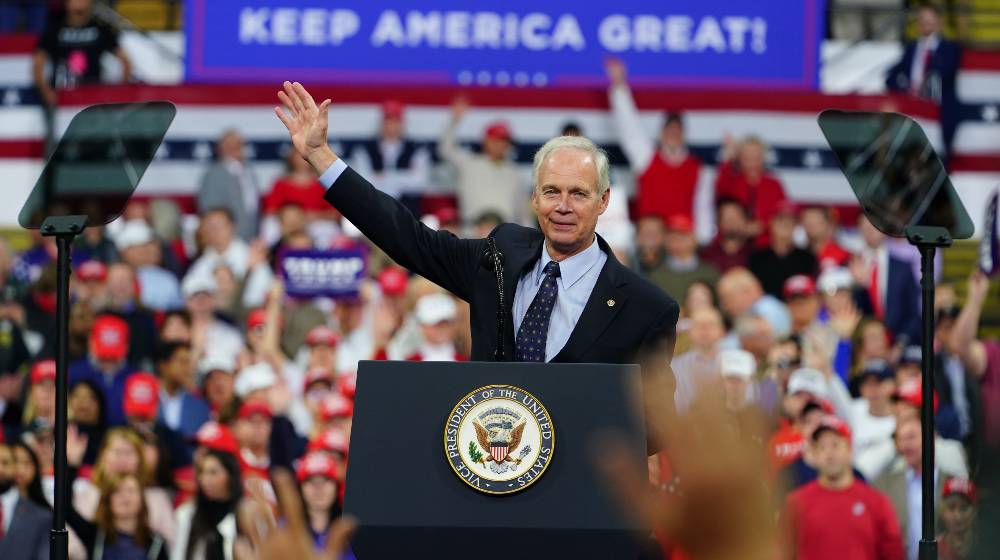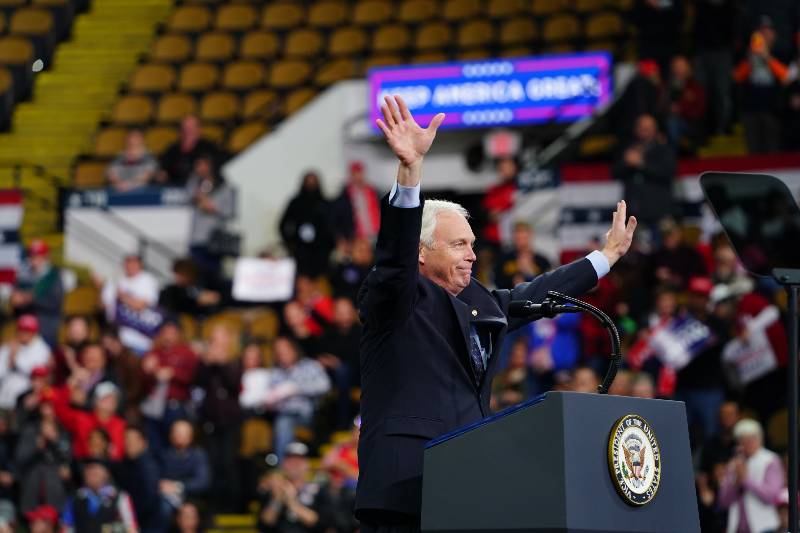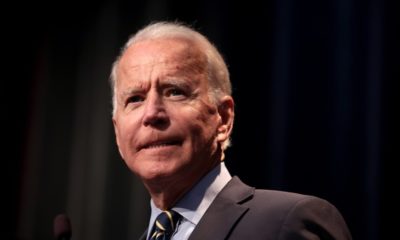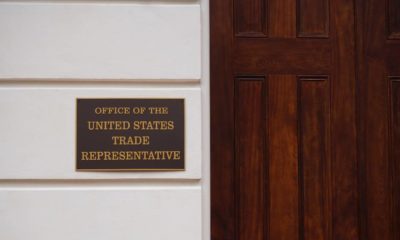Politics
Ron Johnson’s Unconstitutional Elections Scheme

Sen. Ron Johnson (R-Wisconsin) has been urging his state's legislature to seize control of federal elections without going through the normal legislative process.
As he explained to the Milwaukee Journal-Sentinel, he believes that the Constitution empowers the Republican-controlled legislature to act on its own, without presenting a bill to the state's Democratic governor, Tony Evers, for his signature or veto.
RELATED: Trump Concedes Election, Condemns Violence at Capitol
Ron Johnson's Unconstitutional Elections Scheme

This theory is based on a superficially plausible but long-rejected interpretation of two clauses in the Constitution: the Elections Clause in Article I and the similar Electors Clause in Article II, which outline the authority of states over congressional and presidential elections. The relevant provisions are as follows:
The Times, Places, and Manner of holding Elections for Senators and Representatives, shall be prescribed in each State by the Legislature thereof; but the Congress may at any time by Law make or alter such Regulations, except as to the Places of chusing Senators. …
Each State shall appoint, in such Manner as the Legislature thereof may direct, a Number of Electors [for president and vice president], equal to the whole Number of Senators and Representatives to which the State may be entitled in the Congress As Johnson points out, “there's no mention of the governor” in these clauses.
It's not the first time this issue has come up: When the Constitution refers to a state's “legislature,” does that mean only the elected representatives and senators, or does the term mean the state's regular lawmaking process as defined by its state constitution, including things like a potential veto by the governor or a popular referendum?
Settled Law
The constitutional text is admittedly subject to interpretation on that point, especially regarding the legislative role of a state's chief executive.
There's not much evidence that the Framers ever considered how a simple reference to each state's legislature could be ambiguous in this way.
There are other references to state legislatures in the Constitution that clearly do refer to only the legislative body itself, acting alone.
For example, prior to the Seventeenth Amendment, state legislatures elected U.S. senators. It was never understood that the governor could veto the legislature's selection in the same way he or she might veto a bill.
Likewise, when ratifying constitutional amendments, each state's legislature acts on its own, with governors getting no say in the process, nor can the legislature's decision to ratify be rescinded by referendum.
On the other hand, state power over elections has always been exercised through the normal process of lawmaking.
In Smiley v. Holm, the Supreme Court ruled in 1932 that congressional redistricting is this sort of “lawmaking function” in which the state constitution's normal processes apply. That case explicitly settled a challenge to the governor's ability to veto such bills.
The line the Court has drawn is one of structural implication: sometimes the Constitution's reference to a “legislature” means the state's elected legislators acting as in effect a distinct body to play a particular role in a federal process, while other times the nature of the relevant function is inextricably tied up with state lawmaking.
Administering elections, by both practical necessity and longstanding practice, clearly falls into the latter category.
And as Johnson's proposal reveals, it would be untenable to read the Elections Clause and the Electors Clause the way he wants.
In 2015's Arizona State Legislature v. Arizona Independent Redistricting Commission, the Court upheld a ballot initiative that had taken away the legislature's power to draw congressional districts and instead given it to an independent commission.
There, the Court again ruled that in this case “legislature” refers to the state's legislative power, however it might be arranged by the state's constitution.
Writing for the minority in Arizona, Chief Justice Roberts argued for a stricter literal interpretation of “legislature” on originalist grounds, which would have precluded using ballot initiatives and unelected commissions to cut the elected legislators out of the picture altogether.
But as he explained, the dissenters drew a line between mere procedural requirements and substantive restrictions on a legislature's authority.
He made clear gubernatorial vetoes fall into the former category, in much the same way bicameral legislatures must pass bills through both chambers.
In other words, even when they went furthest in the direction of Johnson's argument, all of the justices held that gubernatorial vetoes are a valid part of making election laws.
And that has been the universal practice in the states since the Constitution was ratified, so long as the state gives its governor-general veto power over legislation.
Practical Implications
The body of law and agencies under which elections are conducted in each state is a unified whole, not easily divisible into some things which can be done by regular legislation and other things which could be done by some other process under some other authority.
The whole bundle constitutes each state's election code and is implemented by the same set of officials and, ultimately, by the same set of voters.
For one thing, the state has to fund the administration of its elections through its regular process of appropriations.
It wouldn't make sense for the legislature alone to be able to order things it can't fund, and state legislatures can't typically fund things without presenting a bill to their governor to either sign or veto.
This is one aspect that distinguishes the legislature's role here from things like electing senators (pre-Seventeenth Amendment) or ratifying constitutional amendments, which require no funding or further actions by state officers to carry into effect.
In most states, including Wisconsin, elections for state offices are held on the same day and on the same ballot as federal elections.
As even Johnson concedes, his governor-excluding constitutional theory would only apply to elections for federal offices, potentially resulting in a bizarre bifurcation of election rules and procedures.
Every time that deeply impractical possibility has been raised before, action has quickly been taken to avoid it, including once when Congress and the states acted in record time to amend the Constitution.
Each state must also determine who is responsible for running its elections. In many states, this job falls to the secretary of state, typically themselves an elected official.
In others, the state has created a separate nonpartisan agency or a bipartisan commission to oversee elections.
Wisconsin falls into the latter category, having created the bipartisan Wisconsin Elections Commission (WEC), which consists of three Republicans and three Democrats.
WEC is only a few years old, created by Republicans over Democratic objections in 2015 to replace the previous board of retired judges who had handled both elections and campaign finance laws. But now, WEC is seen by some of its critics as insufficiently aligned with the GOP.
In 2020, as in many states, WEC adopted a number of administrative changes to accommodate the COVID-19 pandemic.
These changes included waiving the need for state employees to visit nursing homes to assist residents in casting absentee ballots, a change that was not controversial or challenged at the time when access to nursing homes was heavily restricted to protect the most vulnerable.
But in the aftermath of Joe Biden's victory and Donald Trump's attempts to overturn the result, these sorts of changes to election procedures were blamed (implausibly) for having produced Biden's narrow wins in key states, including Wisconsin's 20,682-vote margin.
Some officials have even threatened to indict the WEC commissioners for felonies for allegedly violating the state's election laws.
It is in this context that Johnson has urged the legislature to unilaterally take away WEC's power over congressional and presidential elections and assign it to somebody else.
If state legislators act on Johnson's idea, the result would not only be unconstitutional, it would also produce absolute chaos.
Local polling places would have to, in effect, administer two separate elections while reporting to two different authorities.
They might even have to run two different ballots if WEC and the new legislative authority make conflicting decisions about ballot design. Worst of all, the rules for who can vote and how might differ.
It's this last point which reveals the constitutional incoherence of such a possibility because it would violate an explicit constitutional command.
Article I requires that for elections to the House of Representatives, “the Electors in each State shall have the Qualifications requisite for Electors of the most numerous Branch of the State Legislature.”
The Seventeenth Amendment applies identical language to elections for the Senate. If you're eligible to vote for the members of your state's legislature, you must also be allowed to vote for your state's members of Congress.
But that wouldn't be the case if the elections for state offices and elections for federal offices are governed by different rules and different agencies, raising the possibility of some people being allowed to vote for one while being excluded from the other.
For example, if two different sets of rules were adopted for absentee voting, or for voter ID requirements, then some people would inevitably be allowed to vote under one but not the other.
This would be a clear violation of one of the Constitution's most unambiguous requirements, which is why the Constitution does not intend or contemplate splitting the state's authority over elections in this way.
Back to the Drawing Board
There are plausible constitutional arguments about the limits of executive actions or judicial decisions to stray from what the legislature has directed by state law, and those arguments can and should be litigated prior to Election Day.
As the Arizona case revealed, there are also divisions on the Court about if voters or unelected bodies can be included as part of the “legislature,” but there's no such dispute about the inclusion of governors.
The bottom line is that any attempt to change election statutes must follow the state's constitutional procedures for making laws, with the governor either signing a bill or else the legislature mustering the votes to override his veto.
Elections have consequences. In Wisconsin, those consequences currently include a divided government with neither party in total control.
Since the state's governor is a Democrat, and Republicans do not have a veto-proof legislative supermajority, that means any change to the state's election rules must garner bipartisan support.
In other states, the situation is reversed, with contentious redistricting decisions pitting Republican governors against Democratic legislators.
When a state's constitution and the choices voters have made force members of both parties work together, that's a feature, not a bug. The federal Constitution does not provide a way around it.
You Might Also Like:
- This Year’s Thanksgiving Dinner Is 14% More Expensive
- Jury Finds CVS, Walgreens, and Walmart Liable for Opioid Crisis
- U.S. Trade Representative To Consider Renewing Certain Section 301 Product Exclusions
Keep up to date with the latest finance news by following us on Facebook and Instagram.
Article Source: NewsEdge















